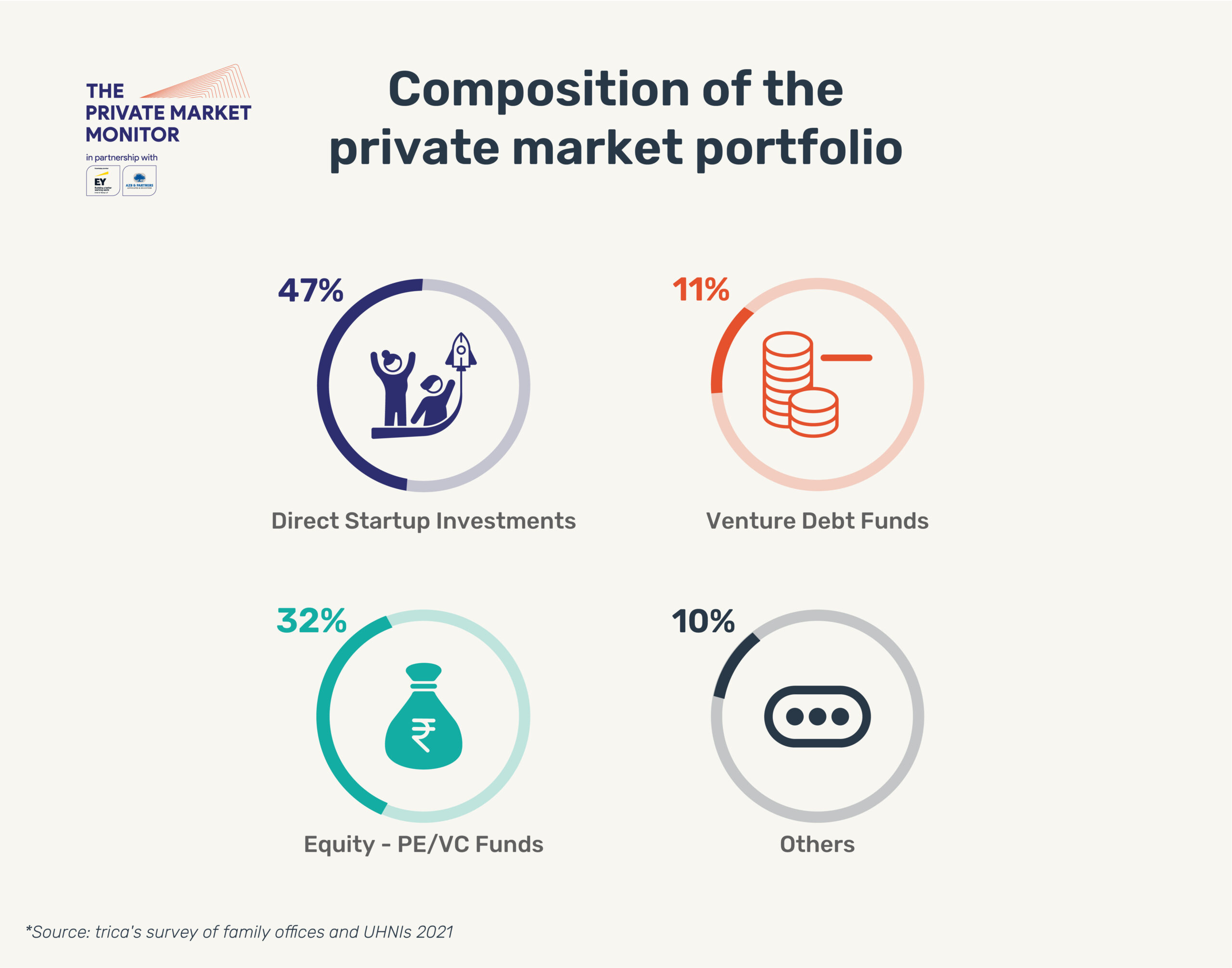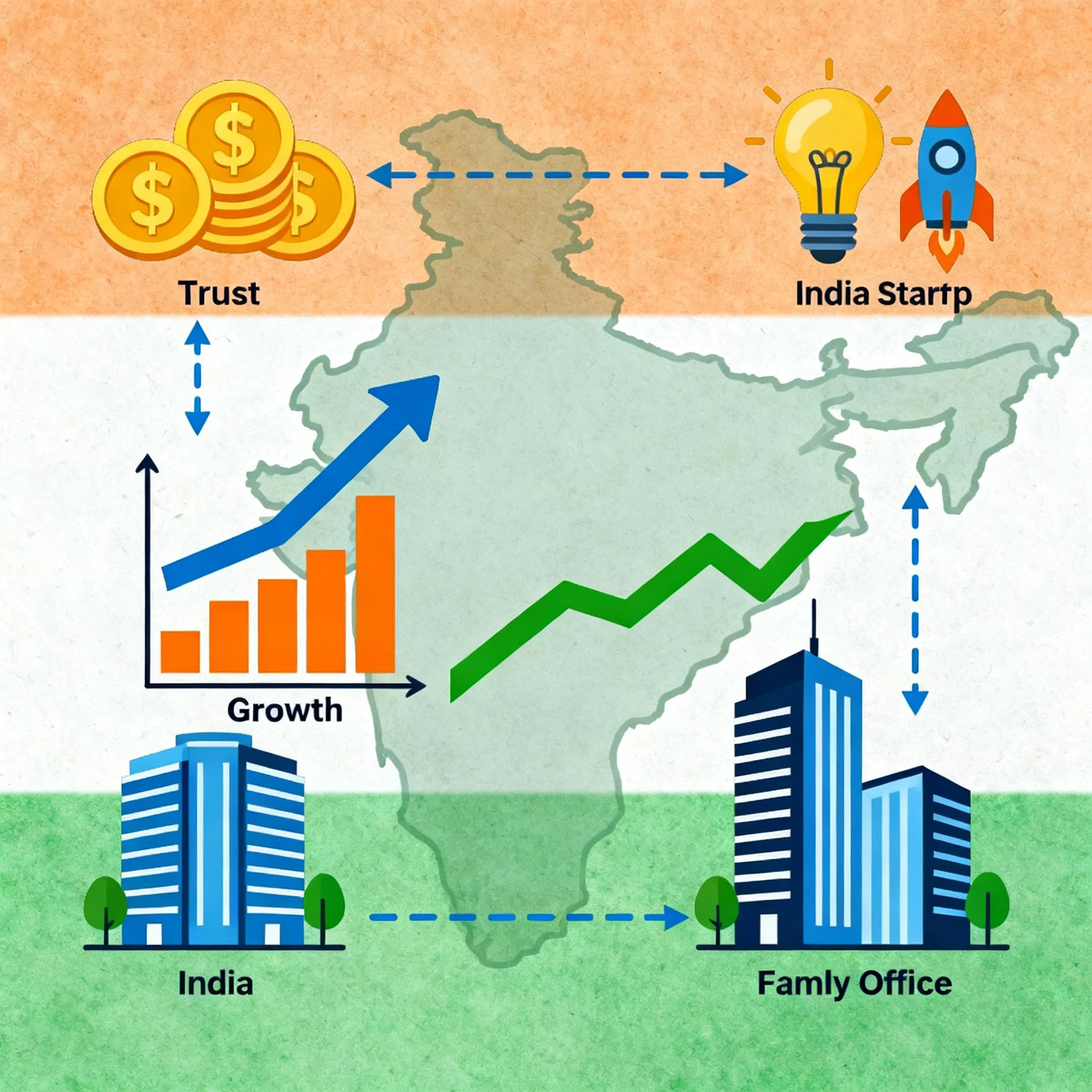
Dr. Aarti Gupta, from the promoter family of the Jagran Group, leads investment strategy at the family office and serves as Chief Investment Officer at Anikarth Ventures, focusing on early-stage startups across India’s private markets. She is also an active angel investor and features as an investor on Horses Stable, India’s first startup funding reality show.
A passionate advocate for women entrepreneurs, Dr. Gupta serves as National Head for FICCI FLO Start-ups and chairs the Startup Committee of the Merchant Chamber of UP, strengthening India’s entrepreneurial ecosystem. An economist by training, she holds a PhD on household borrowing behavior and a postgraduate diploma from Harvard, combining academic rigor with strategic investing to support the next generation of Indian startups.
Her journey, which she describes as “accidental,” reflects a natural evolution from research to wealth creation, guided by data-driven insights and strong founder networks. Through her work, Dr. Gupta continues to empower founders, foster innovation, and shape the future of India’s startup landscape.
How did you transition from being an economist to becoming an investor and fund manager? What mindset shift did that require?
My entry into investing was quite organic. Around 13 years ago, while pursuing my PhD, I started reviewing our family’s financial investments — which were largely in fixed deposits and insurance policies. Gradually, I got more involved in defining the family office’s investment strategy, setting systems and policies, and building a structured portfolio of diversified assets.
Since I’ve always been passionate about finance and numbers, the analytical aspect came naturally. The real shift happened when I moved from public markets to private markets. That transition required deep research, active networking, and continuous learning about angel investing, venture capital, and the broader startup ecosystem in India.
What’s your perspective on the current global economic environment? Do you think India will continue to remain somewhat insulated from the economic challenges emerging from the US?
The global economic landscape over the past three years has been unprecedented. With rising inflation, tightening monetary policies, and increasing interest rates, many major economies are showing clear signs of slowdown and potential recession. Despite these global headwinds, India’s economy has so far remained relatively resilient.
That said, I remain extremely bullish on India’s financial markets and startup ecosystem. The combination of strong governance, rapid digital adoption, and vibrant entrepreneurial energy makes India one of the most promising destinations for venture capital, private equity, and angel investing. The wave of innovation emerging from Indian startups—across fintech, sustainability, and technology—is driving transformative change.
Some key areas we are focusing on include:
- Identifying high-potential opportunities in India’s early-stage private markets.
- Supporting startups that combine innovation with scalable business models.
- Leveraging data-driven insights to guide strategic investment decisions.
As a family office, we are actively engaging in these opportunities, confident in the long-term growth and impact of India’s startup ecosystem.
When did you begin investing in private markets, and how has your approach evolved over time?
Our journey into the private market investing space began around seven years ago, driven by the realization that traditional fixed income instruments were offering compressed yields and public equity returns had plateaued at around 12–15%. To optimize portfolio diversification and capture higher alpha, we began allocating capital towards Alternative Investment Funds (AIFs) across multiple strategies.

Initially, our focus was on pre-IPO investment opportunities and growth-stage funds, which provided attractive exposure to late-stage private companies on the cusp of public listing. As our understanding of the venture capital ecosystem deepened, we expanded into early-stage venture funds and subsequently VC co-investments, allowing us to participate in the innovation economy at its foundational stage.
What adjustments in investment strategy or focus did your family office make over time? Did you tend to invest primarily in sectors or companies where you had strong expertise?
From a temperament perspective, our family remains somewhat cautious about private market investments, primarily because the ROI timelines in venture capital and alternative investment funds (AIFs) are inherently long-term. Most VC and private equity funds operate on a 10-year horizon, and for the older generation, tangible returns are realized only when capital distributions actually reach the bank. However, there was a collective recognition that to stay competitive and relevant, we needed to embrace this asset class transformation and diversify beyond traditional investments.

Our initial exposure began with pre-IPO and DCMP (Debt Convertible Market Participation) funds, which offered shorter liquidity cycles and a measured entry into the private capital ecosystem. We viewed these as transitional instruments bridging the gap between public market liquidity and private market growth potential.
Some key pillars of our early strategy included:
- Partnering with top-tier fund managers to access institutional-grade deal flow.
- Enhancing our understanding of portfolio construction and risk-adjusted returns.
- Building meaningful relationships within the venture capital community.
Understanding that public and private market investments operate with entirely different risk-adjusted return benchmarks, these steps allowed us to navigate the private capital ecosystem more confidently while balancing long-term growth with measured exposure.
Having gained experience through direct investments, how do you foresee the balance between direct investments and fund-based investments evolving in the future?
I prefer direct investments when it’s a sector where I can add tangible value to the company or its founders. Otherwise, investing through a fund tends to be more efficient. At the moment, around 70% of my portfolio is allocated through funds and 30% through direct startup investments. Over the next two years, I expect this to move towards an even 50-50 split.
How does your investment office conduct due diligence and gain a deep understanding of the sectors in which you invest?
Our team is small, with the majority of administrative and accounting work managed by our corporate head office. But we have the right mix of advisors and analysts on board and we have developed a clear investment thesis that includes a filtration mechanism identifying target sectors, deal criteria, and areas we avoid. In startup investing, I often receive more than ten pitches a day, so having the right network is key to accessing the best opportunities. I track investments through quarterly performance metrics, maintain constant founder engagement, and hold regular meetings to offer support—an approach that has strengthened my ability to invest directly in startups.
What key elements shape your family office’s investment thesis?
Our family office investment thesis focuses on backing companies addressing large-scale market problems with scalable solutions and a total addressable market (TAM) big enough to support market leadership potential. We are particularly bullish on consumer tech, space tech, and biotech, while also championing women-led startups and founders solving women-centric challenges. While these focus areas drive our conviction, our overall approach remains sector-agnostic, enabling flexibility across the private market and venture capital spectrum.
Why do you believe women entrepreneurs face challenges in securing funding beyond the Series B stage?

Globally, women founders secure less venture funding than their male counterparts, especially beyond Series B, though this trend is steadily improving in India. Dedicated VC funds and AIFs now target women-led ventures, and we see many promising female entrepreneurs in early stages poised for significant growth and potential IPOs.
Some important insights and recommendations include:
- A Harvard study found VCs often frame promotion-oriented questions for male founders (e.g., revenue growth) but prevention-oriented questions for women founders (e.g., risk mitigation).
- Female founders are advised to reframe prevention-focused questions with promotion-oriented responses, emphasizing growth, scalability, and upside potential.
- This single shift in framing can be pivotal in securing venture funding and attracting investor confidence.
By combining awareness of these biases with strong execution, women entrepreneurs in India are increasingly positioned to access capital and scale successfully.
When discussing investment and strategy with your founders, do you also address diversity, equity, inclusion (D&I), and environmental, social, and governance (ESG) factors? Have you considered making these a formal policy within your investment approach?
Yes, D&I and ESG principles are part of our conversations. While mature startups are already integrating them, early-stage founders need flexibility to focus on growth. I believe all investors and founders should support ethically and environmentally responsible businesses.
One of our export companies in fashion does 50% of production with organic and sustainable fabrics.
Limited Partner (LP) groups worldwide are increasingly demanding stronger D&I practices within their teams and portfolio companies. Do you believe LPs in India will similarly influence domestic funds to adopt such standards?
Globally, LPs are pushing for stronger D&I in their teams and portfolio companies. In India, this pressure is growing but not yet widespread. Diverse teams are crucial to understanding and capturing 50% of the market, especially women. Studies show women-led funds outperform, making diversity a business advantage, not just charity. India’s venture ecosystem will soon embrace D&I as a key investment criterion.
What are some key questions you ask founders during their pitch? How do you get to understand the motivations behind what they are building and their vision?
I ask founders about their moat to understand their unique value proposition and how they plan to sustain a competitive advantage. I also explore how they came up with their business idea, which reveals their passion and the journey behind the venture. Understanding the roles within their team helps me assess the company’s dependence on the founder and the strength of the team dynamic.
Some key areas I focus on include:
- Moat & Competitive Advantage: Evaluating the startup’s unique value proposition and sustainability.
- Founding Story & Passion: Understanding how the idea originated and the journey behind it.
- Team Dynamics: Assessing roles, dependencies, and overall team strength.
- Use of Funds: Reviewing short-term and long-term fund deployment to gauge vision and growth potential.
- Target Market & Product-Market Fit: Ensuring clarity on the market and achieving a strong fit for scalable growth, especially in early-stage startups.
Over the past two years, private companies like Nykaa, Zomato, and Paytm have gone public. In your opinion, were these companies adequately prepared for the demands of the public markets?
Recent IPOs created strong investor interest, but many companies have since seen sharp valuation declines, leading to losses for retail investors and increased caution for future public listings. This highlights the importance for startups to prioritize profitability and strong unit economics before going public. Introducing a startup exchange as an intermediate step could facilitate smoother transitions from private markets to public equity, but it requires better venture capital fund support and regulatory oversight. Going forward, regulators are likely to enforce stricter listing norms to ensure readiness and protect investor interests.

Family offices often operate well-established, profitable businesses—both public and private—spanning decades. Do you think early-stage startup founders receive more valuable guidance from family offices as investors compared to traditional VCs, who primarily focus on rapid growth?
Family offices offer patient, long-term capital with substantial dry powder and deep experience in managing public and private companies. Their firsthand knowledge of IPO processes, shareholder expectations, and market value preservation provides startups with strategic advantage beyond aggressive growth-focused venture capital. This makes family offices valuable partners in later-stage funding, enabling founders to secure better terms and valuations while benefiting from seasoned guidance for sustainable growth.
At LVX, we are partnered with more than 500+ VCs and family offices. Join us and get access to them.




.png)



.png)

.png)

.png)
.png)
.png)
